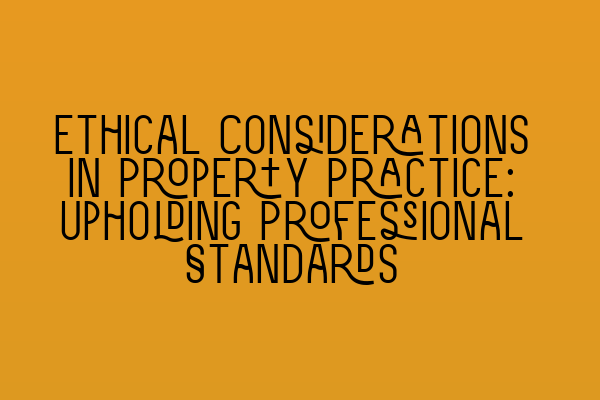Ethical Considerations in Property Practice: Upholding Professional Standards
As property solicitors, it is not only our duty to provide expert advice and legal services to our clients, but also to uphold the highest professional standards and ethical considerations in our practice. The property industry plays a vital role in society, and as legal professionals, it is our responsibility to ensure that our actions align with ethical principles.
Integrity and Honesty
Integrity and honesty are fundamental principles of ethical property practice. We must always act with honesty and transparency in our dealings with clients and stakeholders. This includes providing accurate and complete information, disclosing any conflicts of interest, and acting in the best interests of our clients at all times.
Integrating these principles into our practice not only establishes trust and credibility with our clients but also contributes to the overall reputation of the property profession. Upholding integrity and honesty is crucial for long-term success and client satisfaction.
Confidentiality
Confidentiality is another essential ethical consideration in property practice. As solicitors, we often handle sensitive and confidential information about our clients’ properties, finances, and legal matters. It is our duty to ensure that this information remains confidential and protected from unauthorized disclosure.
By maintaining client confidentiality, we build trust and foster open communication with our clients. This trust is of utmost importance in establishing strong client-solicitor relationships, and it also fulfills our professional obligations under legal and regulatory frameworks.
Conflict of Interest
Identifying and managing conflicts of interest is a critical ethical responsibility for property solicitors. Conflicts of interest can arise when our personal interests or relationships conflict with our duty to act in our clients’ best interests.
It is important to have robust systems in place to identify potential conflicts of interest at an early stage. This includes conducting thorough conflict checks, maintaining awareness of any potential conflicts, and taking appropriate steps to manage and mitigate them. By doing so, we can ensure that our advice and representation remain impartial and objective, instilling confidence in our clients.
Continuing Professional Development
As property solicitors, we must always strive for professional growth and development. This includes staying up to date with regulatory changes, case law, and industry practices. Engaging in continuing professional development (CPD) allows us to enhance our knowledge, skills, and expertise, ultimately benefiting our clients.
CPD can take various forms, such as attending training courses, participating in webinars and conferences, or engaging in legal research. By investing in CPD, we demonstrate our commitment to professionalism and ensuring that our clients receive the highest quality legal services.
Conclusion
Upholding professional standards and ethical considerations is a fundamental part of our role as property solicitors. By adhering to principles such as integrity, honesty, confidentiality, and conflict of interest management, we strengthen our relationships with clients, enhance our professional reputation, and contribute to the overall integrity of the property industry.
If you are preparing for the SQE exams, check out these related articles for additional resources:
- SQE 1 Practice Exam Questions
- SQE 1 Practice Mocks FLK1 FLK2
- SQE 2 Preparation Courses
- SQE 1 Preparation Courses
- SRA SQE Exam Dates
